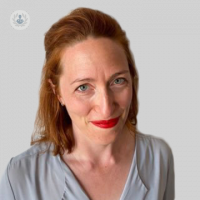PCOS: what to ask your doctor about polycystic ovary syndrome
Written in association with:Polycystic ovary syndrome (PCOS) is a relatively common condition. Polycystic ovaries affect around 20% of women in the UK but the syndrome itself affects around 5-10% of the female population. Dr Rebecca Scott is an expert in endocrinology, the science of hormones. One of her specialist areas is polycystic ovary syndrome. Here, she talks through some of the most frequently asked questions surrounding PCOS.
What is the difference between polycystic ovaries and PCOS?
The term ‘polycystic ovaries’ refers to ovaries which contain many little cysts, often around double the amount found in regular ovaries. On the other hand, polycystic ovary syndrome is a metabolic disorder which displays symptoms such as irregular menstrual cycles, acne, excessive hair growth, and weight gain. The exact cause is unknown but PCOS is thought to relate to an imbalance in hormone levels.

How do I know if I have PCOS?
PCOS can sometimes be difficult to diagnose as symptoms vary from woman to woman, can present at any time from during teenage years to later life and can affect women in different ways – some women may display more severe symptoms, while others only experience mild ones.
PCOS also can run in families particularly if there is a family history of diabetes as well.
What are the symptoms of PCOS?
Symptoms include:
- Hirsutism (unwanted hair growth) which is often seen on the face, back, arms, chest and stomach.
- Weight gain. Many women find it difficult to control their weight and some may struggle with obesity problems.
- Irregular periods or a lack of periods altogether.
- Acne. While acne is common in teens, it can be a symptom of PCOS, as hormonal changes can cause acne breakouts. Oily skin can also be a factor.
- Tiredness/fatigue. Low energy and feeling worn out can be an indicator of PCOS.
- Mood changes. Although this can occur commonly in teenagers, it can also be associated with PCOS. However, mood changes with PCOS are often more extreme than simple mood swings and some women with PCOS suffer from anxiety or depression.
- Difficulty getting pregnant. PCOS is one of the more common causes of infertility or reduced fertility. However, this varies from woman to woman and some are able to conceive naturally.
How is PCOS diagnosed?
PCOS is usually diagnosed with at least two of the following: irregular periods or infrequent periods indicating abnormal ovulation, blood tests or clinical signs of high levels of testosterone or other male hormones, and ultrasound scans showing polycystic ovaries.
There are some other, rarer, conditions that can give the same symptoms as PCOS, so you may need some extra specialist tests, under the care of an endocrinologist or a gynaecologist.
How is PCOS treated?
There is no cure for PCOS but the symptoms can be managed.
Lifestyle changes, such as managing weight through regular exercise and a healthy diet, are frequently encouraged. Many of the symptoms of PCOS can be improved through focus on weight loss and general overall health.
Medications can help with irregular periods, unwanted hair growth or loss, or acne, and in some cases weight loss. Some medications work to control hormone levels while others regulate periods or induce them.
PCOS is associated with an increased risk of diabetes, so if you are diagnosed with PCOS, you should be checked for diabetes and given advice on how to prevent or manage diabetes if present.
Can I still get pregnant if I have PCOS?
If PCOS is treated, most women are able to conceive. For many women with PCOS, lifestyle changes can again help with fertility – losing weight and being at a healthy weight is important. Reaching a body mass index (a measure of height against weight) of under 30 and ideally between 18 and 25, can help to improve your chances of getting pregnant.
A specialist, such as a fertility specialist or specialist in reproductive healthcare can give you the correct medication, such as medication to induce ovulation and will monitor you carefully through the course of the pregnancy.
If you are suffering from PCOS and would like to book an appointment to discuss your condition with Dr Scott, you can do so through her Top Doctors profile today.


